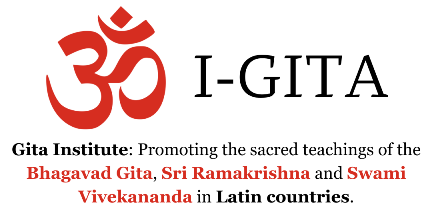Taoism and Business

Taoism: Ethics (Non-action) and Business (China). Laozi
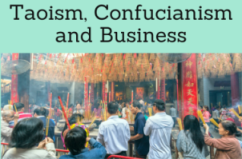
“With more rules and regulations, more people will impoverish” Tao LVII
- Introduction to Taoism
- Laozi
- Taoist principles
- Tao Te Ching
- Tao (Sense) and Te (Virtue)
- Yin Yang
- Principle of Non-Action (Wu Wei)
- Non-Violence
- Principles of the Taoist Ethics
- Taoism today
- Famous Taoist
- Government and Taoism
- Cases of companies with Taoist influence. Chang Yung-fa (I Kuan Tao)
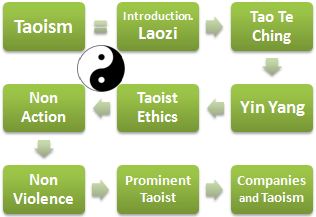
The objectives of the subject “Taoism, Ethics and Business” are the following:
- To know the fundamentals of Taoism
- To understand Taoist Ethical Principles
- To learn about the influence of Taoism on business
- To analyze cases of companies with Taoist influence
“My teaching is similar to other... The strong do not die of natural causes; this will be the starting point of my doctrine” TAO XLII.

Learning materials (Taoism):  or
or  Taoísmo
Taoísmo  Taoisme.
Taoisme.
- Credits “Taoism and Confucianism”: 3

- Duration: three weeks
- Download the syllabus “Taoism and Confucianism” (PDF)
The Subject “Taoism, Ethics and Business” belongs to the following Online Programs taught by EENI Global Business School:
Doctorates: Global Ethics, Religions, and International Business, Asian Business, World Trade.
Masters: International Business, Foreign Trade, Religions and Business.
Course: Taoism, Confucianism & Business.
Area of Knowledge: Religions and Ethics - Asia.

“The Sage focuses on non-action in his works, practices not saying in his speech
The myriad things arise but are disregarded
The sage produces but does not own
Acts but does not claim
Accomplishes work but does not focus on it
Does not focus on it, and thus it does not go.” Tao II
Taoism, Ethics and Business.
Despite the difficulty of obtaining reliable data on Taoism in China; about 50 million people, mostly Chinese, practice Taoism, a religion (or philosophy) founded by Laozi (the Old Master) perhaps born in 604 BCE and who is credited with the key work of Taoism: The “Tao Te Ching” or “The Book of Reason and Virtue,” one of the shorter books of all religions with only 5000 words.
Sample - Taoism, Ethics and Business
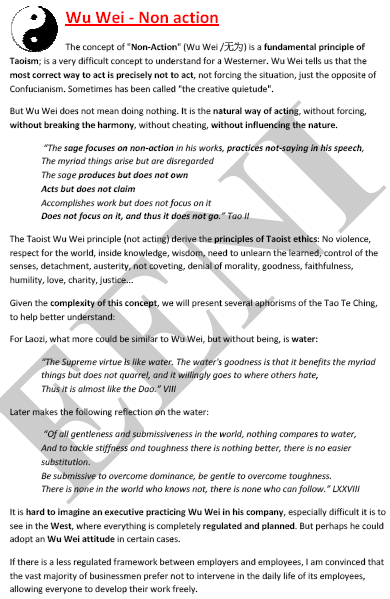
The “Tao Te Ching” is a book tough to interpret. Of all the Asian religions, this is perhaps the most difficult to explain and understand for a Westerner:
“The Tao Te Ching can be read in an afternoon or a whole life.” Houston Smith.
Like Jesus, Buddha, or Confucius, Laozi would not establish any religion. Even though the time has been revered as a God or a Taoist church has emerged.
For Taoists, the order and harmony of the universe are manifestations of the Tao. For Laozi there are no human words to define the Tao.
The Tao is the cause of everything, its origin, and its end. If people follow the Tao, the harmony reigns; if they do not follow it is the chaos. For Laozi, nothing is haphazard. If Confucius treated the Heaven to God, Laozi went one step further. Unlike the Christian concept of God as the Creator of the universe, the Tao has never been created, has always existed.
Like other Asian religions, the Tao speaks of the “total absence of desire” as the path to follow.
The man should not try to modify the Tao; he must let it flow.
The concept of “Non-Action” (Wu Wei /无为) is a fundamental principle of Taoism; is a tough concept to understand for a Westerner. Wu Wei tells us that a correct way to act is precisely not to act, not forcing the situation, just the opposite of Confucianism. Sometimes, has been called “the creative quietude.”
Yin and Yang are manifested in any being or object, even in thought. In all the Tao; we will find constant references to the dual concept of Yin and Yang.
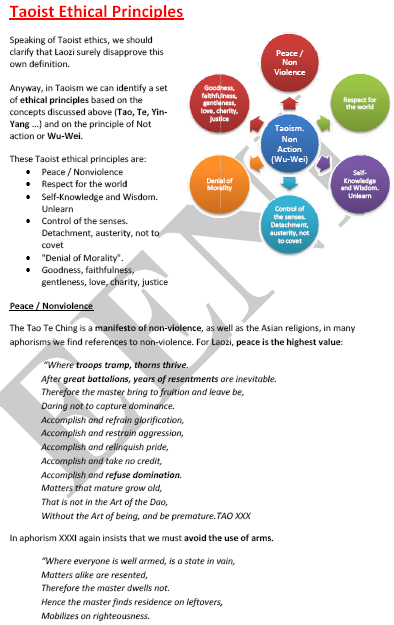


Confucianism and Taoism, Yin and Yang, classicism and romanticism, responsibility and freedom, the two poles of the Chinese society, one would not exist without the other.
These two wisdom traditions, along with Buddhism and Shamanism are part of the spiritual heritage of the Sinic Civilization throughout its area of influence: China, Korea, Japan, Vietnam, Singapore, Hong Kong, and Taiwan.
(c) EENI Global Business School (1995-2024)
We do not use cookies
Top of this page




